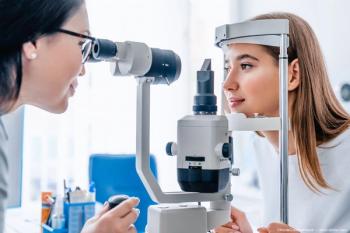
- Ophthalmology Times: February 15, 2021
- Volume 46
- Issue 3
ADVM-022 offers sustained anatomic improvements in wet AMD
Investigators observe dramatic decrease in treatment burden seen in OPTIC study.
This article was reviewed by Arshad M. Khanani, MD, MA
The treatment burden for patients with
Adeno-associated virus gene therapy vector (ADVM-022, Adverum Biotechnologies) has demonstrated the potential to reduce that burden substantially based on the phase 1 OPTIC [NCT03298867] trial results.
Related:
“ADVM-022 is a gene therapy vector designed for continuous delivery of aflibercept [Eylea, Regeneron Pharmaceuticals] by a single in-office intravitreal injection,” said Arshad M. Khanani, MD, MA, managing partner and director of clinical research at Sierra Eye Associates in Reno, Nevada. “The AAV.7m8 capsid allows for efficient retinal transduction after the intravitreal injection.”
The preclinical data from 2 studies of nonhuman primates showed that ADVM-022 facilitated stable long-term protein expression up to both 21 and 30 months after 1 intravitreal injection.
“The continuous expression of aflibercept after 1 injection of ADVM-022 results in levels seen 3 to 5 weeks after a bolus intravitreal injection of aflibercept,” said Khanani.
Related:
OPTIC Trial
The OPTIC Trial is a phase 1, 2-year multicenter dose-ranging trial of ADVM-022 to treat
The secondary outcomes were the best-corrected visual acuity (BCVA), the status of the anatomy based on spectral-domain optical coherence tomography, and the need for supplemental anti-VEGF therapy, according to Khanani.
Four patient cohorts have been enrolled in the study. Cohorts 1 and 4 (6 and 9 patients, respectively) received high doses (6x1011 vg/eye).
Cohorts 2 and 3 (6 and 9 patients, respectively) received lower doses (2x1011 vg/eye).
These patients had a long history of AMD, and the mean numbers of anti-VEGF injections were high, ranging from 24.8 to 34.0 among the cohorts since diagnosis and 9 injections in cohorts 1 through 3 during the 12 months before study enrollment and 7 injections in cohort 4 during that time.
Related:
Oral steroids were administered for 13 days in cohorts 1 and 2, and topical steroids were administered in cohorts 3 and 4 for 6 weeks.
The only difference between the cohorts at baseline was the greater central subfield thickness (CST) in cohort 3.
Results
Khanani presented data from cohorts 1 through 3 on behalf of the optic investigators as of July 23, 2020. The median respective follow-up times were 72, 52, and 36 weeks; the median follow-up in cohort 4 was only 4 weeks.
The most important study finding was that after 1 injection of ADVM-022, the patients in cohort 1 did not need any supplemental injections for 15 months or longer. In low-dose cohorts 2 and 3, a few rescue injections were needed.
“Overall, the treatment burden was greatly reduced in all cohorts and in all patients in the OPTIC study,” Khanani said.
Related:
According to Khanani, the safety analysis across all cohorts showed no nonocular adverse events associated with ADVM-022. Any observed inflammation was well managed with steroid eye drops.
No vasculitis, retinitis, choroiditis, vascular occlusion, or endophthalmitis developed. All ocular events related to the injection were mild to moderate.
One unrelated ocular serious adverse event was a retinal detachment that was resolved with surgery, and 2 patients had mild elevations of intraocular pressure that resolved.
Generally, there were fewer adverse events in cohorts 3 and 4, when a longer-term of prophylactic steroid eye drops was used.
“Strong efficacy was seen with a single in-office intravitreal injection,” Khanani said. “In cohort 1, the long-term BCVA was stable after 72 weeks with no supplemental injections, which highlights the potential of continuous expression of aflibercept from a single in-office intravitreal injection.”
The visual results in cohort 2 were similar to those in cohort 1. In cohort 3, the BCVA improved by 4 letters, and there was a decrease in the CST of 118 µm that was greater initially than in the other cohorts.
Related:
The reduced treatment burden of patients with
“We saw a 100% reduction in the annualized anti-VEGF injection frequency in cohort 1 and in the low-dose 2 and 3 cohorts, the treatment burden was reduced by 87%, both of which demonstrate the power of a single in-office injection of intravitreal gene therapy,” Khanani emphasized.
Khanani remarked on the great potential of ADVM-022 to reduce the treatment burden for this patient population.
“In the OPTIC study, the treatment continues to show a robust response and long-term durability beyond 15 months as the result of 1 intravitreal injection with no supplemental injections needed in cohort 1,” he said.
The results also showed evidence of a dose response, with patients receiving the high dose not needing supplemental injections compared with the patients who received the low dose, of whom two-thirds did not need supplemental mediation.
Related:
Khanani concluded that the frequency of the anti-VEGF dosing decreased by 100% in the high dose group and 87% in the low-dose group. ADVM-022 continues to well-tolerated with a favorable safety profile and warrants further investigation in larger studies.
ADVM-022 for diabetic macular edema
The potentially bright future for this intravitreal gene therapy in
Adverum Biotechnologies is conducting the phase 2 INFINITY trial to assess the effect of a single in-office intravitreal injection of ADVM-022 in patients with DME.
This trial will include 33 patients and will compare an injection of ADVM-022 with an injection of aflibercept. The investigators will also evaluate the treatment burden, visual acuity, retinal anatomy, and safety outcomes.
--
Arshad M. Khanani, MD, MA
e:[email protected]
Khanani is a consultant to Adverum
Articles in this issue
almost 5 years ago
Uveitis: A leading, underestimated cause of visual morbidity in patientsalmost 5 years ago
The untapped potential of cell and gene therapy as treatment optionalmost 5 years ago
More than meets the eye with corneal dystrophiesalmost 5 years ago
Study targets strategies for CI-DMEalmost 5 years ago
Visualization with en face OCT offers value for ophthalmologistsalmost 5 years ago
IOLs offer great vision, low risk profile for myopiaalmost 5 years ago
A menu of glaucoma treatments includes options to fit all scenariosalmost 5 years ago
Managing strabismus after retinal detachment surgeryalmost 5 years ago
Investigators zoom in on future of dry eye treatmentNewsletter
Don’t miss out—get Ophthalmology Times updates on the latest clinical advancements and expert interviews, straight to your inbox.





























